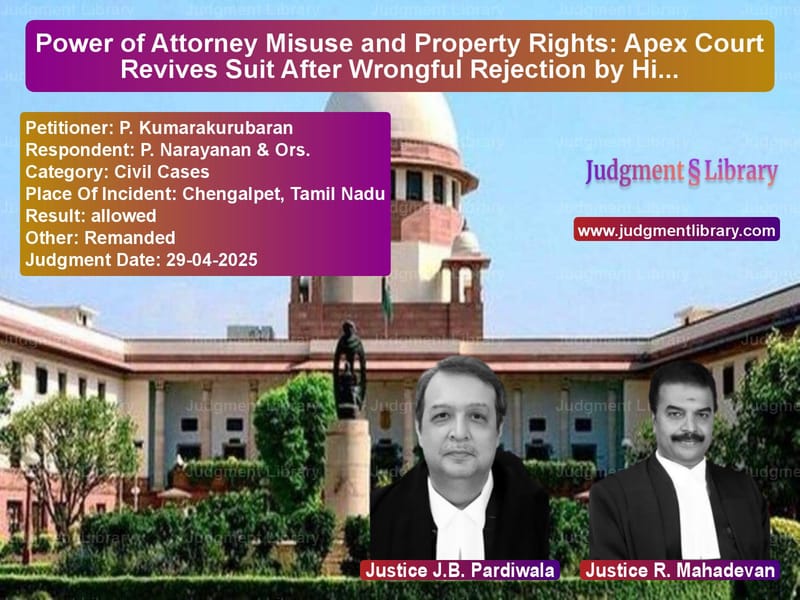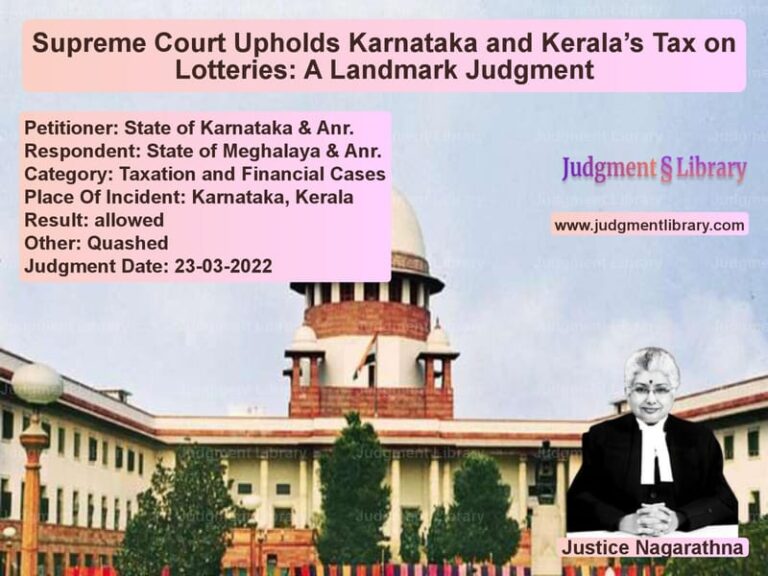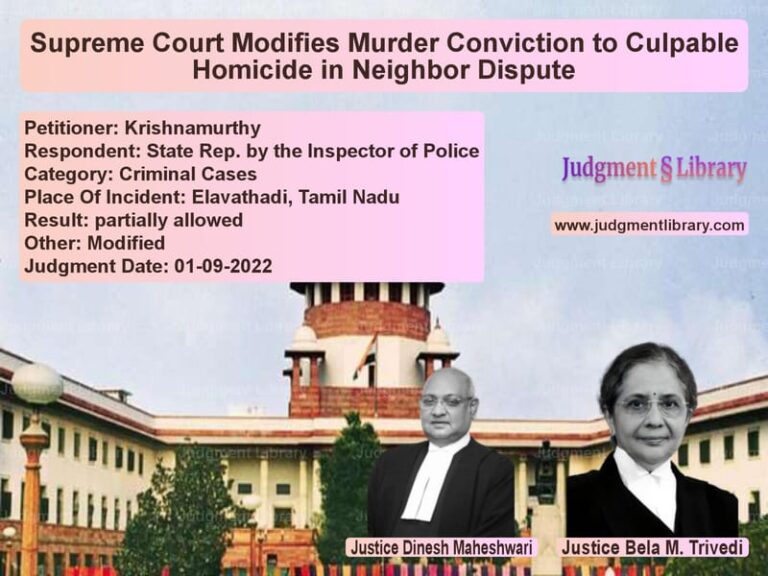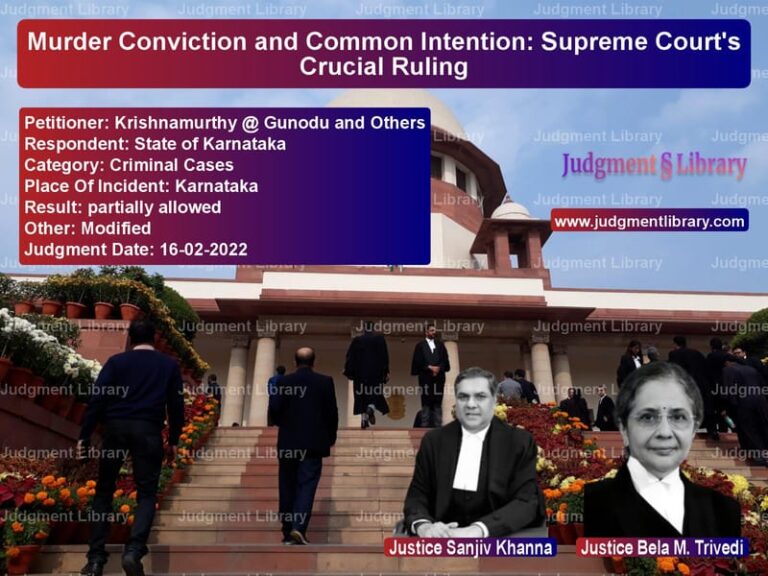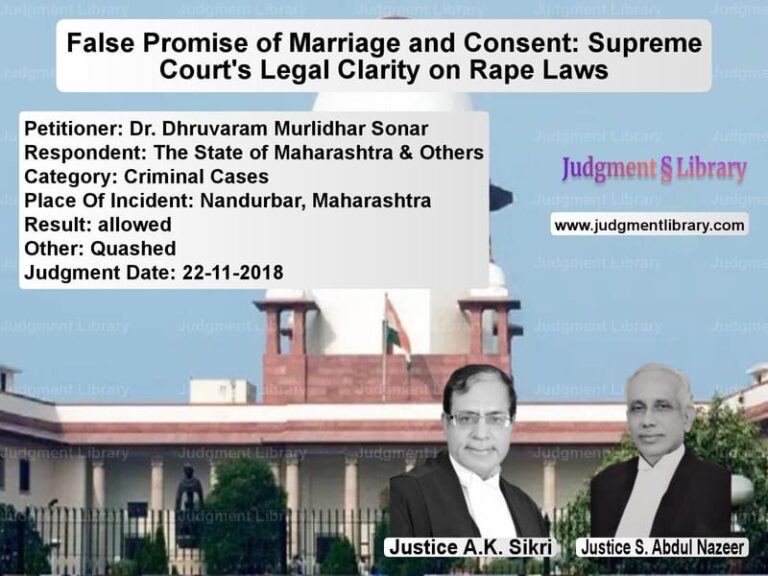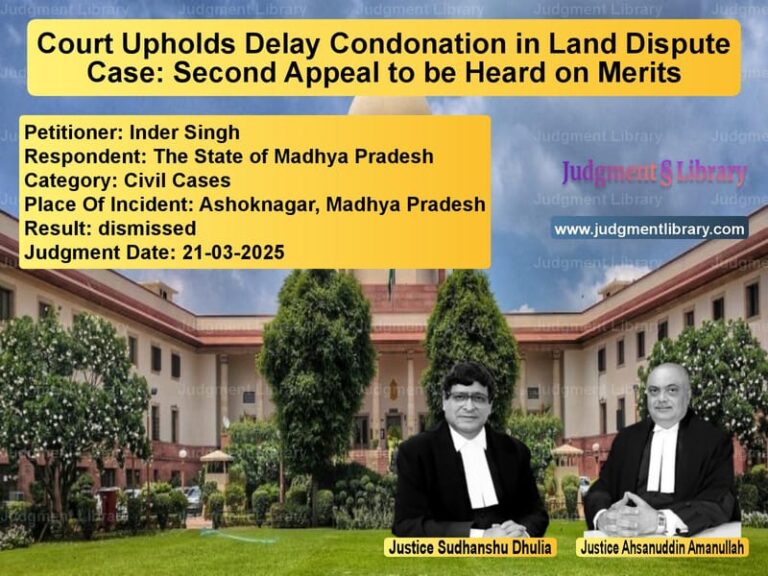Power of Attorney Misuse and Property Rights: Apex Court Revives Suit After Wrongful Rejection by High Court
In a compelling land ownership dispute that revolves around property alienation by a power of attorney holder, the Supreme Court of India has recently delivered a significant judgment reinstating a civil suit previously dismissed by the High Court on the ground of limitation. The case of P. Kumarakurubaran versus P. Narayanan & Others explores crucial legal issues involving misuse of a power of attorney, constructive knowledge, and the limitations of Order VII Rule 11 of the Civil Procedure Code.
The Dispute and Origins of Litigation
The appellant, P. Kumarakurubaran, filed a civil suit in 2014 before the Principal District Court, Chengalpet, asserting ownership of a parcel of land that was originally assigned to him by the Special Tahsildar, Tamil Nadu, in 1974. He claimed to have constructed a house on the plot and to have peacefully enjoyed possession over the years. In 1978, he executed a registered power of attorney in favour of his father for limited purposes—construction and related activities. Unbeknownst to him, the father executed a sale deed in 1988 transferring the property to the appellant’s niece (Defendant No. 1), who later executed a series of transactions ultimately resulting in Defendant No. 3 acquiring authority over the land through a chain of conveyances. These acts were carried out without the appellant’s knowledge or consent.
After discovering the transactions in 2011, the appellant lodged a complaint under the Land Grabbing Cell and applied for individual patta and other administrative redress. When the defendants began constructing a new building on the site in 2013, he objected and subsequently filed a comprehensive suit seeking declarations and injunctions against the respondents, alleging fraud and unauthorized transfer of property.
Rejection of the Suit and High Court’s Verdict
During the suit’s pendency, the respondents filed an interlocutory application under Order VII Rule 11 CPC, arguing that the suit was time-barred under Article 59 of the Limitation Act, 1963, and should be rejected. The trial court dismissed the application, affirming that the matter involved triable issues that required evidence. However, the High Court reversed this decision, concluding that the suit was barred by limitation and rejected the plaint at the preliminary stage.
Petitioner’s Arguments in Supreme Court
Challenging the High Court’s decision, the appellant argued through counsel that:
“The question of limitation—especially in matters involving the knowledge or notice of the impugned transaction—is a mixed question of law and fact, which cannot be conclusively determined without a full-fledged trial.”
The counsel further asserted that the plaint specifically alleged unauthorized alienation of property by the appellant’s father and included detailed claims of fraud. They contended that:
“The execution of the sale deed and subsequent transactions were carried out beyond the scope of the power of attorney, which did not authorize the appellant’s father to alienate the property.”
They argued that the plaint contained specific factual averments requiring evidence and that rejection of the suit on limitation grounds without permitting evidence would be contrary to law.
Respondents’ Counterarguments
In response, the counsel for the respondents argued that:
“The suit is barred by limitation as the appellant had knowledge of the sale deed executed in 1988 and failed to take legal action within the prescribed three-year period under Article 59 of the Limitation Act.”
They claimed the appellant, being closely related to the defendants, could not plausibly assert ignorance for over two decades. They also defended the power of attorney, asserting that it empowered the father to execute lawful agreements, including sale deeds.
Supreme Court’s Observations and Findings
The Supreme Court, led by Justices J.B. Pardiwala and R. Mahadevan, decisively overturned the High Court’s rejection of the plaint, citing a string of precedents on the scope and application of Order VII Rule 11 CPC. The bench held:
“The issue as to whether the appellant had prior notice or reason to be aware of the transaction at an earlier point of time, or whether the plea regarding the date of knowledge is credible, are matters that necessarily require appreciation of evidence.”
They emphasized that:
“Once the date of knowledge is specifically pleaded and forms the basis of the cause of action, the issue of limitation cannot be decided summarily. It becomes a mixed question of law and fact, which cannot be adjudicated at the threshold stage under Order VII Rule 11 CPC.”
The Court further noted that the power of attorney did not contain any express authority permitting the father to alienate the property. They remarked:
“The appellant has categorically averred in the plaint that he executed the registered power of attorney in favour of his father solely for the limited purpose of constructing a house and carrying out related activities. There is no express clause authorizing his father to sell the suit property to any person without the appellant’s consent and knowledge.”
In view of the above, the Court stated:
“The trial Court acted within its jurisdiction in refusing to reject the plaint and in holding that the matter ought to proceed to trial. The High Court ought not to have interfered in the absence of any jurisdictional error or perversity in the trial court’s order.”
Final Verdict
Allowing the appeal, the Supreme Court set aside the judgment of the High Court and restored the trial court’s order, thereby allowing the civil suit to proceed to full trial. The bench concluded:
“This appeal stands allowed in the above terms. The suit is restored for trial on its merits.”
Conclusion
This judgment is a powerful reiteration of the legal principle that issues of limitation, particularly when they involve the date of knowledge or allegations of fraud, cannot be summarily dismissed at the threshold. It underscores the importance of letting trial courts examine complex factual matters through evidence. The ruling will serve as a critical precedent in future civil cases involving contested property transfers through power of attorney, especially where the core issue is the scope of the agent’s authority and the actual knowledge of the principal. More broadly, it safeguards the right to a fair trial and ensures that technical grounds do not prevent the substantive adjudication of rightful claims.
Petitioner Name: P. Kumarakurubaran.Respondent Name: P. Narayanan & Ors..Judgment By: Justice J.B. Pardiwala, Justice R. Mahadevan.Place Of Incident: Chengalpet, Tamil Nadu.Judgment Date: 29-04-2025.Result: allowed.
Don’t miss out on the full details! Download the complete judgment in PDF format below and gain valuable insights instantly!
Download Judgment: p.-kumarakurubaran-vs-p.-narayanan-&-ors.-supreme-court-of-india-judgment-dated-29-04-2025.pdf
Directly Download Judgment: Directly download this Judgment
See all petitions in Property Disputes
See all petitions in Specific Performance
See all petitions in Damages and Compensation
See all petitions in Contract Disputes
See all petitions in Judgment by J.B. Pardiwala
See all petitions in Judgment by R. Mahadevan
See all petitions in allowed
See all petitions in Remanded
See all petitions in supreme court of India judgments April 2025
See all petitions in 2025 judgments
See all posts in Civil Cases Category
See all allowed petitions in Civil Cases Category
See all Dismissed petitions in Civil Cases Category
See all partially allowed petitions in Civil Cases Category

